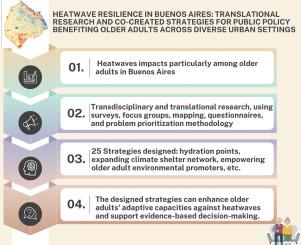布宜诺斯艾利斯的热浪抵御能力:转化研究和共同制定的公共政策战略,惠及不同城市环境中的老年人
IF 3.6
引用次数: 0
摘要
气候变化加剧了布宜诺斯艾利斯(CABA)的热浪,导致重大的公共卫生影响,特别是对脆弱的老年人。本研究旨在产生可操作的信息,以提高老年人对城市热浪的适应和反应能力。材料和方法本跨学科转化研究(2024年1月- 6月)采用混合方法。数据收集包括634项调查、4个焦点小组、4份问卷和政策/行为者映射。调查在CABA随机抽样点进行,并根据2022年人口普查进行加权,以确保在城市正规和弱势部门中具有代表性,同时考虑到地区、年龄和性别。地理信息系统综合了城市住区类型、绿地、温度、停电和老年人密度。通过三次跨部门管理委员会会议确定问题优先次序的方法促进了战略的制定。结果:通过确定需求、脆弱性和应对机制,结合利益相关者映射,一个机构间工作组制定了18项可行的初步战略。这些战略包括管理水合点,扩大气候庇护所网络,增强老年人环境促进者的权能,增加现场工作人员的参与,以及加强脆弱社区的安全用水分配,特别是在停电期间。绘制的地图使我们能够确定未来干预的重点领域。本研究通过确定目标人群的实际需求,从而为基于证据的决策提供有价值的知识。设计的策略有可能提高老年人对热浪的适应能力。本研究采用的方法,特别是跨学科方法和综合知识共同创造,为未来城市公共管理领域的气候适应研究提供了一个有价值的模式。本文章由计算机程序翻译,如有差异,请以英文原文为准。

Heatwave resilience in Buenos Aires: Translational research and co-created strategies for public policy benefiting older adults across diverse urban settings
Introduction
Climate change has intensified heatwaves in Buenos Aires (CABA), leading to significant public health impacts, particularly among vulnerable older adults. This study aimed to generate actionable information to enhance older adults' adaptive and response capacities to heatwaves in the city.
Materials and Methods
This transdisciplinary translational study (January-June 2024) employed a mixed-methods approach. Data collection involved 634 surveys, 4 focus groups, 4 questionnaires, and policy/actor mapping. Surveys, conducted at randomized CABA sampling points, were weighted by the 2022 Census to ensure representativeness across formal and vulnerable city sectors, considering region, age, and gender. Geographical Information System mapping integrated urban settlement types, green spaces, temperature, power outages, and older adult density. A problem prioritization methodology across three intersectoral management board meetings facilitated strategy development.
Results
The identified needs, vulnerabilities, and coping mechanisms, integrated with stakeholder mapping, led to the formulation of 18 feasible initial strategies by an operational interinstitutional working group. These strategies include managing hydration points, expanding the climate shelter network, empowering older adult environmental promoters, increasing field worker engagement, and reinforcing safe water distribution in vulnerable neighborhoods, especially during power outages.The created maps allowed us to pinpoint priority areas for future interventions.
Conclusions
This research contributes valuable knowledge by identifying the targeted population's actual needs, thereby supporting evidence-based decision-making. The designed strategies hold potential to enhance older adults' adaptive capacities against heatwaves. The methodology employed in this study, particularly the transdisciplinary approach and integrated knowledge co-creation, offers a valuable model for future climate adaptation research within urban public administrations.
求助全文
通过发布文献求助,成功后即可免费获取论文全文。
去求助
来源期刊

The journal of climate change and health
Global and Planetary Change, Public Health and Health Policy
CiteScore
4.80
自引率
0.00%
发文量
0
审稿时长
68 days
 求助内容:
求助内容: 应助结果提醒方式:
应助结果提醒方式:


